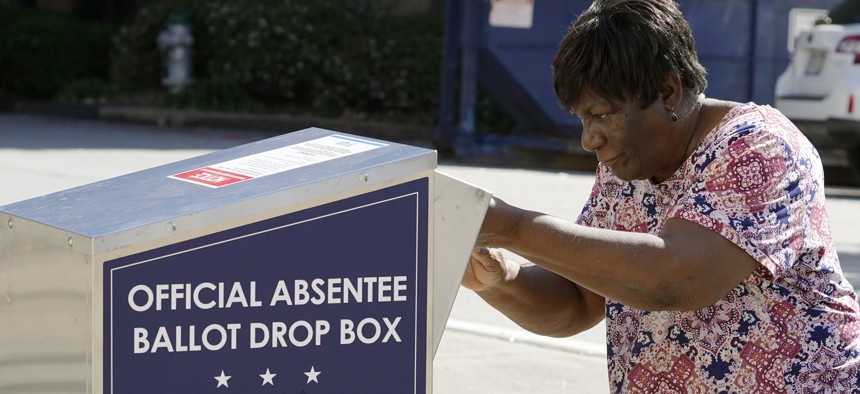The States that Make it Most Difficult to Vote

In this Oct. 19, 2020 file photo, a voter drops their ballot off during early voting in Athens, Ga. AP Photo/John Bazemore
A report by the Center for Election Innovation and Research compares which states allow voters to cast absentee ballots by mail without an excuse and offer early in-person voting.
Thirty-six states offer residents the ability to vote by mail or in person ahead of Election Day, two baseline measures of ballot access integrity, according to a new report that ranks the ease of voting across the United States.
Six states were ranked the most restrictive because they require voters to provide a reason in order to vote absentee by mail and they do not offer universal early voting options, according to the report from the Center for Election Innovation and Research. The states where it is considered most difficult to vote include Alabama, Connecticut, Mississippi, Missouri, New Hampshire and South Carolina.
“The important point is that 36 states are already pretty much there,” said the report’s author David Becker. “They might vary on when and where early voting is available … but for all, at a minimum, every eligible voter can receive a mail ballot without an excuse and every voter can vote early in person.”
Seven other states were considered slightly restrictive because, while they required an excuse for absentee voting, they did offer universal early voting, said Becker, the center’s executive director. Those states are Arkansas, Delaware, Kentucky, Louisiana, New York, Tennessee, Texas and West Virginia.
The analysis comes as Congress is considering a sweeping election reform bill that would overhaul the nation’s voting, campaign finance and ethics laws and impose new mandates on state and local elections officials.
The House approved the legislation last month and it is now under consideration in the Senate. The Senate Committee on Rules and Administration is set to hold a markup of the bill on May 11.
Provisions included in the bill, known as the For the People Act or H.R. 1, “would raise the floor” for the 15 states that restrict early voting and absentee voting, Becker said.

Election reform has been a hot topic for lawmakers across the country since the 2020 elections, which saw record turnout as states expanded voter access. Absentee and early voting options were vastly expanded due to the coronavirus pandemic, but since then legislators have introduced more than 360 bills that restrict voter access, according to the Brennan Center for Justice, a liberal think tank.
Georgia adopted legislation this year that makes numerous changes to how elections are administered in the state, leading to criticism that it will become much more difficult to cast a ballot there.
The law is “a step back” for voter access, for instance, by making it more difficult to access ballot drop boxes, Becker said. But Georgia is still ranked as an easy voter-access state in the report because the measures included in the legislation still allow for early voting and voting by mail.
Among the most criticized elements of the Georgia law is a provision that requires voter ID verification for an absentee ballot. Voters must submit a driver’s license or social security number to verify their identity. But about 97% of registered Georgia voters have a driver’s license record with the state and almost all the remaining 3% have a social security number, Becker said.
While much of the state-level election reform has gotten marred in partisan battles, Becker points to Kentucky as an example of a state that worked in a bipartisan manner to expand voter access.
“It’s not the easiest to vote in, but it’s really moving in the right direction,” he said.
After expanding early voting options during the pandemic, the state approved a measure this year to permanently expand early voting options.
“They tried to figure out how to make things easier for voters and worked across party lines to do that,” Becker said.
Andrea Noble is a staff correspondent with Route Fifty.
NEXT STORY: Texas House Approves Bill that Would Allow People to Carry a Gun Without a License





